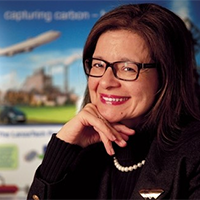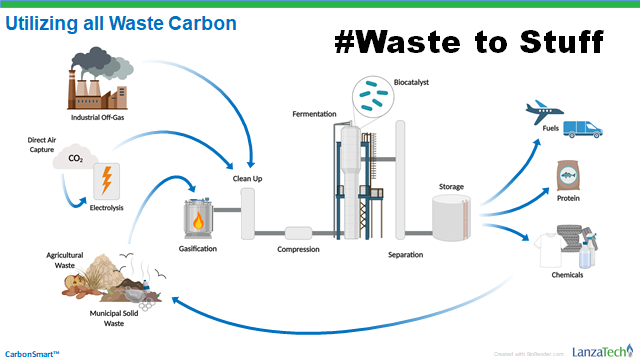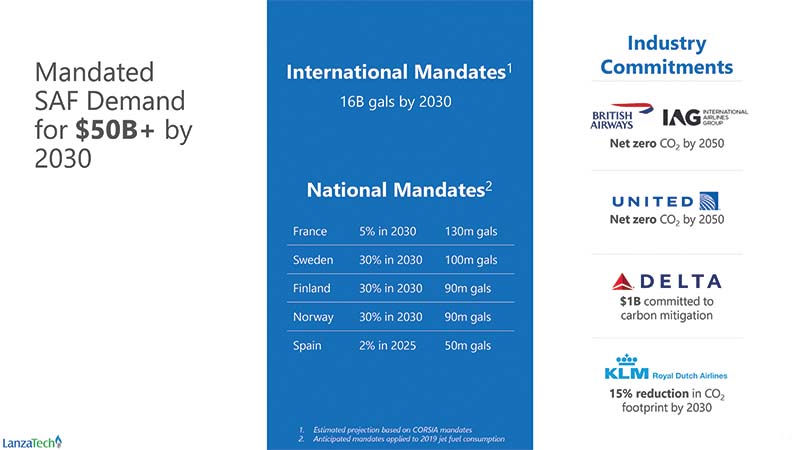Executive Brief
 Based on a presentation by
Based on a presentation byJennifer Holmgren, Chief Executive Officer
LanzaTech
This Executive Brief is based on a recent presentation to Frost & Sullivan’s Growth Innovation Leadership Council Members. Usually reserved for members-only, we’re sharing this brief to give you a taste of the valuable content membership brings. Click here to learn more about our growing growth council.
Abstract
Consumers are increasingly embracing sustainability and this unlocks growth opportunities for companies. Sustainable Aviation Fuels (SAF) will play a key role in reducing carbon for the aviation sector. As airlines look beyond the pandemic, real world case studies of financial and legislative bottlenecks will be highlighted to show how we can scale up much needed volumes of SAF to mitigate climate change.
Introduction
Recently, Jennifer Holmgren, Chief Executive Officer, LanzaTech, led a Virtual Case History exclusively for Growth Innovation Leadership Council Members. Holmgren, who holds a Ph.D. in Chemistry, is currently focused on new process technologies. The scientist, leader and innovator began her discussion by introducing the concept of energy democracy. Jennie Stephens, a Professor of Sustainability Science and Policy at Northeastern University, describes this term as follows: “Energy democracy is an emerging social movement that connects the renewable energy transition – moving away from fossil fuel reliance – with the redistribution of social, political and economic power.”1
Holmgren stated that all carbon is precious. Like many others, she firmly believes that we need to change our mindset about carbon, and determine and operationalize ways to reuse it; chemicals and carbon need fuel. Her organization, LanzaTech, utilizes waste carbon and turns it into useful products via a fungible platform that uses waste to make fuels and chemicals. The company has scaled the so-called “CarbonSmart™” process shown in the below graphic as #wastetostuff. They are currently developing it further in China and other locales.

Holmgren stated that biology enables the process of processing chaotic inputs (like waste) and will adjust around the chaos. She noted that ethanol, a colorless, volatile, flammable liquid that is the intoxicating agent in liquors, and is also used as a solvent and in fuel 2 can be created and dispersed to make many of the chemicals we use today. In short, power can be carbon free. As noted, traditionally, aviation fuel requires carbon, but LanzaTech has developed a technology to use ethanol in aviation fuel. It has been tested and proven on flights and offers multiple benefits, including reduced costs and reduced emissions. Holmgren believes that sustainable aviation fuel is critical to the success of the aviation industry and that to reduce carbon use you need to change the fuel. Current projections indicate that sustainable aviation fuel is expected to become a 50 billion dollar industry by 2030. Airline industry mandates and carbon mitigation goals are depicted on the graphic below:

A different investment approach
It can be difficult to raise money for breakthrough ideas and products. Holmgren shared that LanzaTech required partners to make commitments before “gaining a seat at the table” for their new fuel product. Interested parties needed to invest in a plant first; once they see the results and success, they can help fund it and other projects moving forward. LanzaTech requires that all funding for all phases occur up front. This distinct funding approach is worth noting: When the council members were polled about their biggest hurdles to rolling out new products and scaling up, investment hurdles was one of the top challenges cited across industries.
More specifics about their funding approach were provided by Freya Burton, Chief Sustainability and People Officer at LanzaTech:
“Through our novel approach, we have greatly reduced the time it takes to raise cash as the technology scales. We need to deploy all sustainable solutions as quickly as possible, in order to meet the carbon and climate challenges we currently face. Any mechanism that reduces the time needed to scale is therefore incredibly important. All LanzaJet investors have committed to build commercial production facilities after the technical and financial KPIs of the commercial demo are met. This is like the model used in the pharmaceutical industry, when drugs are going through the lengthy certification phase. In that case, passing a stage brings a cash call not a new cash raise. LanzaJet is the first time it has been used in the process industry and it is an approach we need to adopt more widely in order to scale quickly.”
Creating a circular economy
Holmgren noted that fossil carbons are a big part of our lives (fueling energy transportation, etc.). She believes that we should change the trajectory and move towards making products from recycled carbon and/or genetically modified organisms. Importantly, you need collaboration with others to achieve this. New policies that support trying new technologies and scaling them quickly must be encouraged and enabled. A distributed world that re-uses wastes is a very desirable and necessary goal. Holmgren is a true proponent of a circular economy which aims to eliminate waste and continually (re)use resources. As she stated, everything we use in daily life can be made from a waste product; “no carbon should be left behind.” One example cited was L’Oreal bottles, which have been created with recycled carbon.
As the thought-provoking presentation concluded, council members expressed how impressed they were. As one member summed it up, “Great presentation on the fundamentals of a circular economy…waste to value.” Another member added, “A very nice example of sustainability innovation leadership.” Holmgren took the opportunity to remind all that consumers are increasingly interested in supporting eco-friendly initiatives. In fact, according to a recent survey, almost 65% of consumers identify as being eco-conscious. And many eco purchasers will pay more too.



Recent Comments